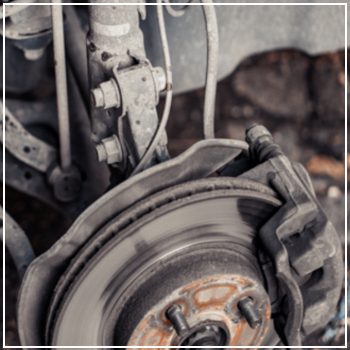 When your brakes are squealing or you have to exert additional pressure to stop, you may take your vehicle to an auto body shop. You learn the brakes or rotors need to be replaced, so you can get back on the road safely. Yet, less than a year after the replacement, you experience brake failure again. Are you not storing your car correctly, allowing rust to affect your brakes?
When your brakes are squealing or you have to exert additional pressure to stop, you may take your vehicle to an auto body shop. You learn the brakes or rotors need to be replaced, so you can get back on the road safely. Yet, less than a year after the replacement, you experience brake failure again. Are you not storing your car correctly, allowing rust to affect your brakes?
When Aftermarket Brakes Get Installed
Although that could be a possibility, there’s a more likely scenario: You went to an auto body shop that installed aftermarket brakes.
Perhaps the shop was recommended or endorsed by your insurance carrier because they do repairs for the lowest cost possible. In any case, aftermarket brakes don’t just fail prematurely – they can threaten your safety every time you’re on the road.
To perform high-quality repairs with our customers’ safety in mind, DaSilva’s Auto Body uses original equipment manufacturer (OEM) parts for all repair and replacement jobs – brakes included. Here’s what you should know about aftermarket brakes.
How Are Aftermarket Brakes Made?
Original equipment manufacturer brakes are made of pickled and oiled galvanized steel. In general, galvanized steel is preferred for its resistance to the elements. Pickling and oiling the material removes remnants of scale from the manufacturing process and prevent the pads from rusting and premature failure.
Under current OEM regulations, galvanized steel is first submerged in acid to remove the oxide layer that developed during production and is then coated in oil to reduce future oxidation – or delay it significantly. Construction wise, this combination improves adhesion between the brake pad and backing plate, which works in conjunction with the car’s friction lining and rotors.
Inconsistent regulation for brakes has resulted in aftermarket versions being made of a substance called “black steel”, given that name for the layer of black oxide left on the surface. Black steel, which may be coated with a silvery color to have the appearance of galvanized steel, is problematic for three key reasons:
- In terms of performance, black steel is less likely to remain secured to the friction lining, causing the newly added brakes to detach during operation. This affects the car’s stopping distance and places all occupants in danger. Some motorists may find they are not able to stop at all.
- Because the initial layer of oxidation has not been removed, black steel rusts sooner. Even if the part remains attached, rusting can cause it to experience premature wear and fail in a relatively short time.
- While OEM brakes go through rigorous industry testing, aftermarket brakes are not held or manufactured to the same standards. As such, black steel is perfectly acceptable despite its performance and safety issues.
Standards and Regulations for Aftermarket Brakes
No state and federal regulations exist for aftermarket brakes like they do for their OEM counterparts. To compare performance, the Global Brake Safety Council conducted three studies assessing black steel to illustrate how self-regulation among aftermarket vendors places drivers at risk on the road.
The studies conducted found that aftermarket brakes contain oxide layers that directly correlate with poor performance, early rusting and safety issues. Results indicated that:
- Aftermarket brakes have a higher incidence of failure, increasing the risk a driver will be in an accident. Failure can increase stopping distance or prevent the brake from stopping the car.
- Aftermarket brake pads tend to rust sooner, resulting in the pad binding to the caliper and causing the backing plate to detach from the friction lining.
- While not all aftermarket brakes use black steel, a visible percentage do, increasing the likelihood that a car with this part will experience failure sooner. As such, installing aftermarket brakes might cut costs, but can gamble the driver’s safety due to higher corrosion and rusting risks.
Learn more about the differences between OEM and aftermarket parts and why we use OEM parts for all repairs. To book an appointment, contact our Naugatuck shop today.




